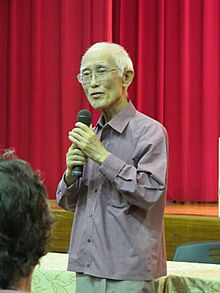Yu Kwang-chung facts for kids
Quick facts for kids
Yu Kwang-chung
|
|
|---|---|

Yu Kwang-chung in 2011
|
|
| Native name |
余光中
|
| Born | 21 October 1928 Nanking, Republic of China |
| Died | 14 December 2017 (aged 89) Sanmin, Kaohsiung, Taiwan |
| Language | Mandarin and English |
| Nationality | Republic of China |
| Education | MFA at the University of Iowa |
| Alma mater | National Taiwan University University of Iowa |
| Period | 1952–2017 |
| Notable works | Blue Feather Cold War Years Tug-of-war with Eternity |
| Notable awards | Order of Brilliant Star |
Yu Kwang-chung (born October 21, 1928 – died December 14, 2017) was a famous writer, poet, teacher, and critic from Taiwan. He was also known as Yu Guangzhong. He wrote many books and poems that are still enjoyed today.
Yu Kwang-chung's Life Story
Yu Kwang-chung was born in 1928 in a city called Nanjing (then known as Nanking). When he was young, his family had to move often because of wars. First, they fled during the Second Sino-Japanese War when Japan invaded. Later, they had to leave again because of the Chinese Civil War.
In 1950, Yu and his family moved to Taiwan. He had studied English at the University of Nanking and Amoy University. He then graduated from National Taiwan University with a degree in foreign languages. He also earned a special degree called a Master of Fine Arts from the University of Iowa in the United States.
Yu started his career as a university teacher in 1956. He taught at several universities, including The Chinese University of Hong Kong and National Sun Yat-sen University. He even taught in the United States at Gettysburg College. He received important awards for his work, like the National Award for Arts in 1989.
Yu Kwang-chung was married to Fan Wo-tsun starting in 1956. He passed away on December 14, 2017, in Kaohsiung, Taiwan, due to pneumonia.
Yu Kwang-chung's Writings
Yu Kwang-chung wrote a lot! He published 17 collections of poetry and 12 collections of prose (which are like essays or stories). After the 1970s, his poems often talked about how people who moved from mainland China to Taiwan missed their home.
His writing covered four main areas: poetry, prose, translation, and commentary. People loved his essays because they were often funny and clever. His poems showed his deep understanding of different cultures.
Yu was very good at both traditional Chinese and modern literature. He was also excellent in English and taught English at universities. He loved learning new languages and could speak French, German, Spanish, Italian, and even Russian! Sometimes, he would use these languages in his Chinese essays to compare Chinese and Western cultures.
See also
- List of Taiwanese authors

